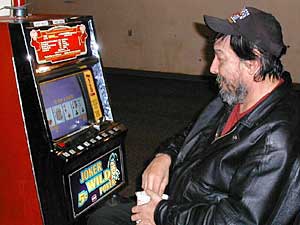Photos
More from MPR
Your Voice
| ||||||||||||||||||||||||||||||||||||||||||||||||||
Lawmakers forcing showdown with tribes over gambling
March 3, 2004
Two Republican lawmakers say the state should outlaw video slot machines statewide unless the state's Native American tribes agree to share a portion of their casino revenues. Indian tribes are reacting negatively, calling the plan a form of legislative blackmail.
St. Paul, Minn. — Minnesota's current gaming compacts, negotiated 15 years ago, provide for no revenue-sharing between the state's 11 tribes and state government. The compacts also have no expiration date, to the dismay of many lawmakers who'd like to renegotiate them.
But Sen. Tom Neuville, R-Northfield, says the state does have one fairly unsubtle way to get the tribes' attention -- demand they return to the bargaining table or pull the plug entirely on the most lucrative casino games. Neuville says since the compacts were signed, the number of tribal video slot machines has exploded.
"What we've seen since then is a relatively unregulated and significant expansion of the number of slot machines in Minnesota," Neuville says. "Our calls haven't been heard. And frankly I think this is intended to be a strong message that we want you to come back and negotiate."
|
This is reminiscent of so many meetings with the federal government over the last 200 years, where they come in with guns and they come in with threats. And my sense is tribes will not respond positively to this at all.
- John McCarthy, Minnesota Indian Gaming Association |
Neuville says the state has the authority to outlaw video slot machines statewide, including on tribal lands. The bill would ban the machines beginning in 2006, unless all 11 tribes agreed to new compacts that directed a share of revenues to the state.
Reaction from Indian interests was quick and severe. Gordon Adams, Jr., -- a tribal council member for the Bois Forte Band of Chippewa -- called the prospect of outlawing video gaming "extortion." Adams says those revenues are used to address the economic needs of struggling Indian communities.
"The profits and the proceeds from our casino are helping and improving the better standard of living for our elders and for our children," says Adams. "This is why I'm so burned about this, because this is going to affect my kids and my children's children."
John McCarthy of the Minnesota Indian Gaming Association estimates that video slot machines generate 70 to 80 percent of casino profits in Minnesota. He says taking away that form of gambling would be crippling -- and he says tribes won't respond to an approach that appears heavy-handed.
"This is reminiscent of so many meetings with the federal government over the last 200 years, where they come in with guns and they come in with threats. And my sense is tribes will not respond positively to this at all," says McCarthy.
McCarthy says the bill could also derail recent talks between tribal leaders and Gov. Tim Pawlenty. Pawlenty last month called for a re-examination of compacts in his State of the State address. A gubernatorial spokeswoman says the governor hasn't had a chance to see the latest proposal, but will give it due consideration.
House Republicans have also passed a bill to authorize a casino at the Canterbury Park race track in Shakopee. The "racino" would funnel up to $100 million a year into state coffers. Rep. Jim Knoblach, R-St. Cloud, supports adding slots at Canterbury. He is also the lead House author of the bill threatening to outlaw slots statewide.
Knoblach says there's no inconsistency in supporting both bills. He says he'd prefer to restrain gambling by re-negotiating contracts. Failing that, he says he'll support the state at least earning a slice of the revenue.
"We're going to have racino; we're going to have all sorts of gambling establishments someday, unless we come to terms with this. My preference would be to pass this bill, but for the time being, I'm also supporting racino," Knoblach says.
House Speaker Steve Sviggum is a strong supporter of racino. And he said, through a spokesman, that he looks favorably on the latest proposal as well.
But the lead authors acknowledge the plan faces serious roadblocks in the Senate, where many DFL legislators have been reluctant to upset the existing casino landscape.
|
News Headlines
|
Related Subjects
|


